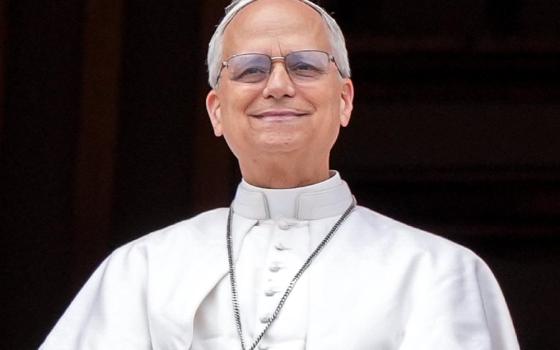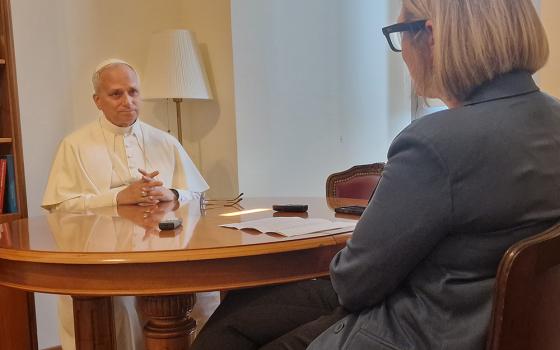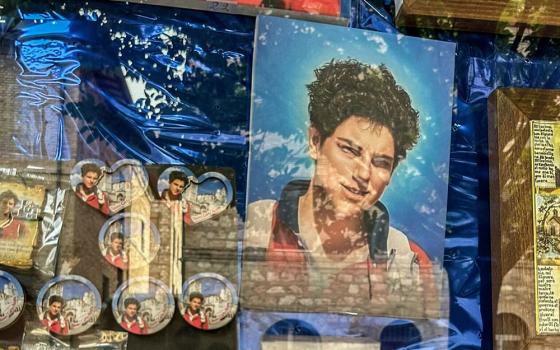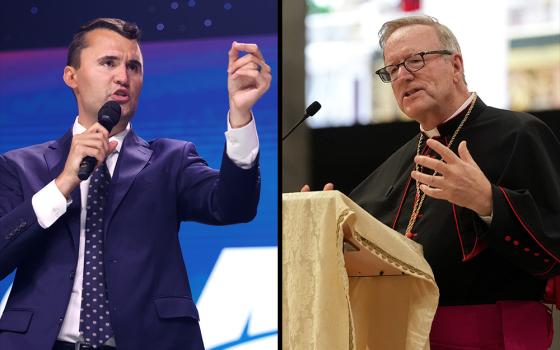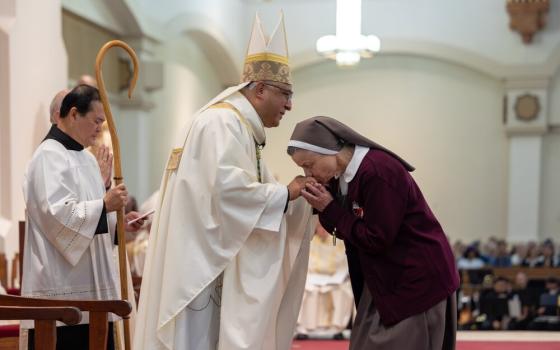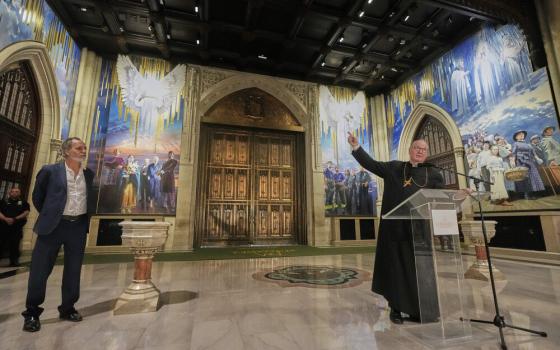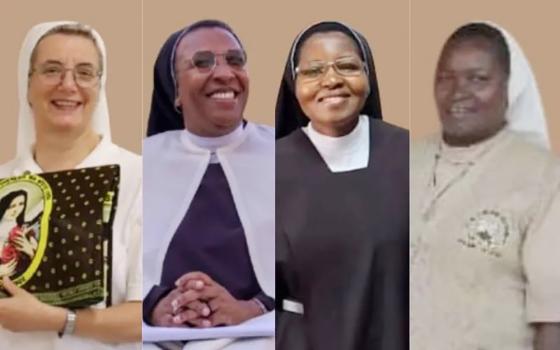
(Unsplash/Steve Johnson)
How do you contribute your unique gifts to the church you love when you are not welcome to participate fully? This is a question that haunts many LGBTQ+ Catholics, caught between faith and exclusion, and one that groups like DignityUSA attempt to answer.
Over the July Fourth weekend I joined Dignity for their semiannual conference in the suburbs of Columbus, Ohio. The title of the conference, "We Are God's People: Here, Now, Always," lent a clue to what was in store: a glimpse of what is possible when LGBTQ+ Catholics gather not just for belonging, but for affirmation. In such spaces, LGBTQ+ Catholics don't have to wait for permission to be ourselves or to serve; we claim our place boldly, bringing our full selves — gifts, struggles and all — into the life of the church.
And that is exactly what I witnessed at the conference.
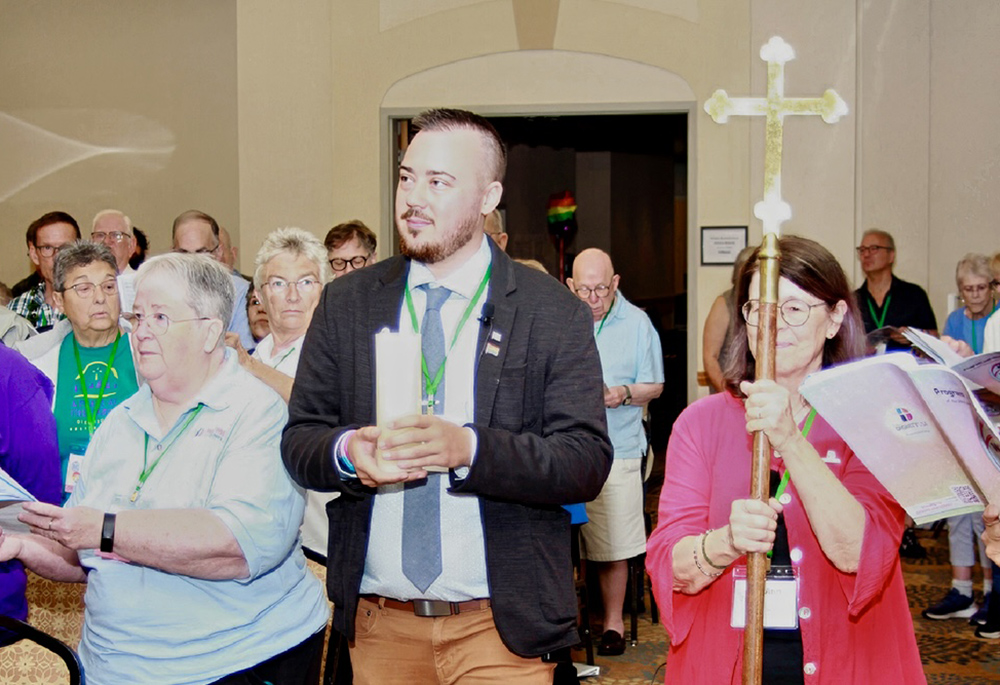
Max Kuzma carries a candle alongside Ann Penick during the liturgy procession on Sunday, July 6 on the final day of the Dignity USA conference. The title of the conference, focused on the inclusion of LGBTQ+ Catholics, was "We Are God’s People: Here, Now, Always." (Neal Raffensberger)
This event was colorful. There were vibrant banners with tassels, liturgical dancers and rainbow stoles. It wasn't just young people like myself, despite what conservative pundits want you to believe. Attendees included LGBTQ+ adults: married lesbians and gay men who have families, kids, jobs, mortgages and 401(k)s. Ordinary people. Ordinary Catholics. Joining together to celebrate Catholic spirituality and LGBTQ+ community: here, now, always.
It was a relief to listen to panels that centered the experience of LGBTQ+ Catholics in their own words, from their own perspectives, without the need to translate for a heteronormative culture. In one breakout session, Immaculate Heart of Mary Sr. Jane Aseltyne opened her presentation on "How LGBTQIA+ People Image God" by cheekily saying she was accustomed to beginning with a little "LGBTQ 101" for the audience — but not at the Dignity conference!
As a transgender person and a lifelong Catholic, I have carried the tension of loving a church that has often made me feel invisible or unwelcome. Years ago, while doing an online search about sexuality and gender, I came across DignityUSA and immediately dismissed it as "too hippie." Affirming gay people? Liturgies with women homilists, or even presiders? No one in my fundamentalist bubble would ever listen to a group like this. I was afraid. The only messaging I had received up to that point in my life was that "real" Catholics weren't gay.
Fast forward years later to the 2025 Dignity conference, where I was delighted to find that all my old fundamentalist fears were true: This group really was bold, inclusive, committed to justice for LGBTQ+ Catholics and devoted to the social teachings of the church.
I was delighted to find that all my old fundamentalist fears were true: This group really was bold, inclusive, committed to justice for LGBTQ+ Catholics and devoted to the social teachings of the church.
In recent years, ministries like Outreach have emerged in response to growing hostility and outright violence towards the LGBTQ+ community — and have faced no small backlash from Catholic keyboard warriors online as a result.
But Dignity has been around for a lot longer. It was founded by Fr. Patrick Nidorf in 1969, even before the Stonewall riots. In 1986, then-Cardinal Joseph Ratzinger published "On the Pastoral Care of Homosexual Persons," causing several American bishops to order that DignityUSA no longer be allowed to hold Mass in Catholic churches. In some cases, the group chapters had been holding Mass in these locations for a decade or longer. It was a painful blow.
In the face of this rejection by the institutional church — and during the horrors of the HIV/AIDS crisis and the assassination of gay rights activist Harvey Milk — the voices of Dignity members joined with the popular LGBTQ+ anthem by Holly Near: "We are a gentle, loving people, and we are singing, singing for our lives." We sang this song again together at the conference this year.
Advertisement
In her keynote, Immaculate Heart of Mary Sr. Nancy Sylvester discussed the importance of contemplative prayer in the lives of those devoted to social action. At one point she asked the audience to pause and practice sitting in contemplative prayer for 10 minutes. For years, this type of meditation had been anathema for me. I had not been able to sit quietly within myself, because my self was deeply uncomfortable all the time. Back then, I was attempting to suppress my queer identity — and it wasn't working. Instead of practicing stillness, my mind would chase every noise and distraction, anxiously wondering when we would get to open our eyes and move freely again.
But not this time.
This time, I was able to close my eyes and sit in the presence of God without shame, without guilt, without anxiety. I know who I am now, and I'm not running away from that truth.
Something profoundly meaningful happens within a community where you are fully loved, welcomed and accepted: your relationship with God, and with the church itself, is transformed. Such a community nurtures the courage to embrace your identity as part of God's creation. It offers not only solace but also a call to action, rooted in the church's social teachings and the lived experience of justice and love.
DignityUSA is a living witness to the possibility of a church that truly includes all people. As the LGBTQ+ community continues to face new challenges, holding fast to the assurance of our own inner authority in relationship with the divine is a powerful act of resistance and hope. This is the banner we fly: a banner of peace, courage and unwavering faith in the God who loves us as we are.

